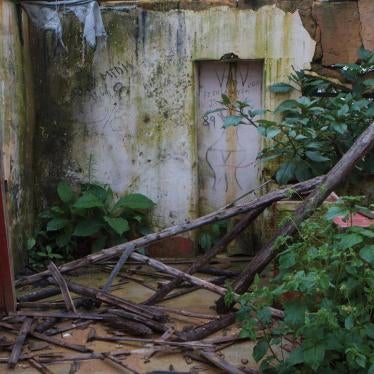“I learned early-on that extreme inequalities exist in the world,” said Amanda Klasing, researcher in Human Rights Watch’s Women’s Rights Division, who grew up in the United States, in South Texas. “My family would regularly cross the border to Mexico to visit friends. Even as a small child, I was disturbed to see kids my age selling chewing gum on the corners when we crossed into poorer communities in Mexico.” She wondered why the children were not in school, and even when she was very young, it confounded her sense of fairness.
That image of inequality often comes back to Klasing as she meets with women and girls in Latin America and the Caribbean who are struggling to exercise their rights and live decent lives in often dangerous circumstances. She thought about it most recently in Colombia, with its sleek, modern cities. Bogota, with its shopping centers and quaint cafés, can make it easy for people to forget the violence of the country’s rural areas, where decades of fighting between the FARC guerrillas, government forces, and paramilitaries has ravaged entire swaths of the country.
The fighting has displaced 2 million women and girls, as threats or violence against them or their families forced them to flee their tight-knit villages for cities like Medellin, Cartagena, and Bogota. But even there they are often cut off from the peace and prosperity of the city centers.
In Colombia, Klasing researched how the lives of these women had changed in the years since they were first uprooted.
For most, she learned, the violence continued. Domestic abuse rates devastated families as husbands, frustrated in their inability to find work or adjust to their new lives, lashed out physically. Strong women who fought back against dangerous people in their communities were targeted for rape. And women who experienced these assaults didn’t know where to find health care or other help. They lived on the outskirts of Colombia’s cities, some in shacks, and many had electricity or water only because they clandestinely connected their homes to public facilities. They didn’t know where to turn for help.
Klasing had seen this cycle of violence before, working in Haiti after the earthquake in 2010. When displaced women made their way to camps, they should have been safe. But as with the women in Colombia, they continued to face violence, and their risk increased with their vulnerability.
From the start, Klasing knew that she wanted to help overcome inequality. In college and graduate school, she studied anthropology. For her fieldwork, she chose a Mayan community in Mexico to study the exclusion of women from community development projects. But the academic world frustrated her. Although she could work with and learn from different groups of people in Latin America and the US, it gave her no opportunity to push for changes that would help improve their lives. So she went to law school to study human rights – a field in which she can actively work toward ending practices that harm marginalized or vulnerable groups and in which she can help governments do their jobs and make people’s lives better.
In Port-de-Paix, Haiti, Klasing served as the principal investigator for the Right to Water Project, a joint effort of Partners in Health, the Robert F. Kennedy Center for Justice & Human Rights, and the New York University School of Law, where she also earned her law degree. For Human Rights Watch, she continued to address rights abuses in Haiti, focusing on women’s and girls’ right to health after the earthquake.
Klasing hopes her report on Colombia will help improve the lives of women there. “The country has strong laws, but they need to be enforced,” she said.
“Also, I want this report to remind Colombian society that the millions of people who fled the violence continue to suffer the devastating effects of being uprooted from their homes,” she said. “It’s too easy for those living good lives in Colombia’s beautiful cities to forget this.”







